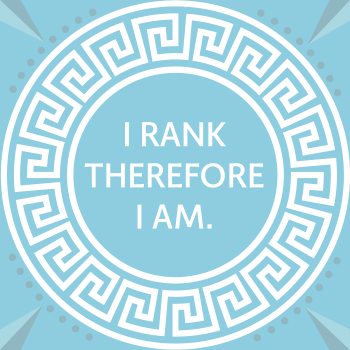It’s easy to forget that philosophy and science maintain a symbiotic relationship. SEOs seem to spend a disproportionate amount of time trying to uncover how search engines work and what the engine’s spiders are seeking. We look at the hard-coded facts of the online world. We desperately gather information from past analysis, blending it with present strategy in order to affect future outcomes. We tend to focus on the science of it all. It’s easier to comprehend, easier to target and much easier to measure. We forget to take a step back and look at the larger picture, to practice my favorite aspect of SEO – philosophy.
Everything changes and nothing stands still; a sentiment that permeated the work of the Greek philosopher, Heraclitus. It’s an interesting proclamation that warrants philosophical reflection on the future practice of SEO, as current methods of optimization might not always be relevant or lucrative. Online marketing is a complex system, the rules of which could remain unchanged for an indefinite stretch of time. But eventually Google alters the online landscape with a ranking algorithm change. Simply reacting to these new algorithms isn’t sustainable. You need to be proactive, to start thinking about what Google wants to become. Then you can forge a corresponding philosophy on what role SEO should play.
The Matchmaker
Google’s end destination has always revolved around returning the best, most insightful and most trustworthy sources of content. They are matchmakers, providing answers to questions and solutions to problems. The algorithms that power rankings are just working towards discovering more effective methods of content evaluation. When you understand this fundamental nature of search engines, this guiding principle of behavior, you unearth one of the SEOs greatest strengths – the ability to comprehend quality content, to decipher what is useful and what is not. It’s a powerful human ability that cannot be matched by a piddling mathematical equation. Leverage this advantage to create copy that is both comprehensive and unique, and make sure it can resolve the searcher’s query in an efficient manner. Continue to evolve this material to maintain relevancy, and never assume this is a set-it-and-forget-it process. With quality content, a website becomes better aligned with Google’s end destination. The next initiative involves making it visible to searchers, so they can digest and share it.
The Signals
In Google’s idealistic world, search engines would be able to rank a website solely based on the caliber of its content, with distinction being determined by organic signals supplied by editorial links and votes of approval from social media, user engagement and the perception of applicable industry natives. Increased reliance on natural signals is another element of Google’s end destination, but a very sanguine and naive aspiration. For the last two decades, a website’s backlink profile has played a mighty role in determining if a website’s subject matter is trustworthy. Links play a large contributing factor as to how well a website ranks, and they are deeply ingrained in determining page ranking. For this reason, links have been both the focus of manipulation and the subsequent target of past algorithm changes. Over the past few years, Google has focused on cleaning up backlink profiles and penalizing websites that became over-optimized with obnoxious quantities of suspicious links from unrelated or weak domains. Organic and editorial links are a phenomenal indicator of what web users find useful, so don’t assume links will recede in importance anytime soon. However, the merit of these links will be under constant evaluation. What might seem like an asset today could very well shift into a liability. In the spirit of keeping with Google’s aim, it is best to be very selective and to exercise caution in establishing link-building endeavors. A superior alternative is to find avenues to build links in a more pure yet equally effective way, such as putting your website at the center of your marketing efforts. Make it the hub that feeds off all the authority and awareness created through ancillary SEO practices and traditional marketing techniques.
The Facilitator
If Google’s utopian ideal involves the ability to judge content through organic signals in an attempt to solve the questions and problems of searchers, then an SEO needs to facilitate the matchmaking process. This is the new philosophy of use for future SEO. Make a website easy for a search engine to crawl and understand. Fill it with tons of truly quality content. Focus on the organic inputs that determine ranking and promote the matchmaking process. The science of SEO can tell you what inputs a search engine is looking for to rank pages, but to determine all of the indirect inputs that people or technology can do to influence those ranking elements is the philosophy of SEO. Looking at website optimization from this perspective reveals just how all-encompassing the practice is. SEO becomes neuropsychology, conversion optimization, social media management, user experience evaluation, web design, web development, branding, analytics, product, advertising and public relations. All of these elements can indirectly affect the inputs that impact ranking; they feed and grow off each other in a way that is easy for Google to acknowledge and reward.
The path Google will take in reaching their end destination will no doubt meander. It’s part of a SEO’s job to maintain knowledge of these movements and capitalize on timely opportunities. We just have to remember that SEO is a river in which you can never step twice, where everything flows and nothing stays. Remember to stop looking at our feet, at the constant change, because navigating to the end destination becomes far less complicated when you look up to understand where the river is headed.

